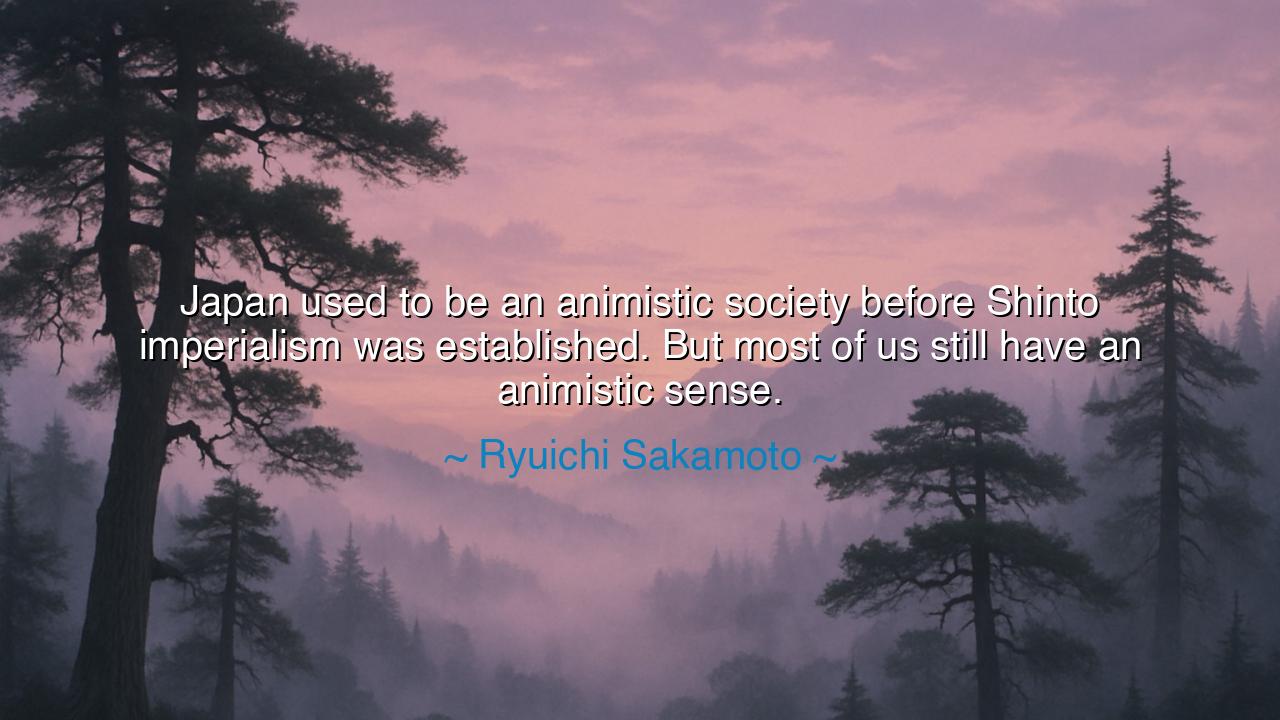
Japan used to be an animistic society before Shinto imperialism
Japan used to be an animistic society before Shinto imperialism was established. But most of us still have an animistic sense.






Hear the words of Ryuichi Sakamoto, musician, thinker, and poet of sound, who declared: “Japan used to be an animistic society before Shinto imperialism was established. But most of us still have an animistic sense.” These words, spoken with quiet reverence, summon us to remember the ancient roots that nourish the spirit of a people. They speak of a time before temples and state rituals, before doctrine was bound to throne and empire, when the world itself was alive with presence, and every stone, tree, and river bore a soul.
The meaning is profound. To call a culture animistic is to affirm that the divine is not distant, locked in heaven, but immanent in all things—seen in the mountains, heard in the wind, felt in the streams. Before Shinto imperialism, before religion was tied to power and emperor, the people of Japan looked upon nature with awe and intimacy. Even when institutions later claimed authority, Sakamoto reminds us that this animistic sense never truly died. It lives on in the Japanese heart—in gardens that flow like rivers, in shrines nestled beneath ancient trees, in the reverence with which the seasons are still celebrated.
History itself testifies to this. When the Meiji state transformed Shinto into a tool of national unity and imperial might, it sought to codify what had once been fluid, to command what had once been freely felt. Yet even as emperors rose and fell, and as the machinery of empire turned faith into power, the people still carried within them the older wisdom: that life is sacred because it is interconnected, that humans are not masters of nature but participants within it. This memory endured through centuries, like a hidden current beneath the surface of a great river.
We see this enduring spirit in Japanese art and culture. The films of Hayao Miyazaki, with their forests filled with spirits, their rivers alive with gods, their worlds where machines and humans must reconcile with nature, are not mere fantasies. They are echoes of that animistic sense Sakamoto describes. In these stories, we glimpse how ancient beliefs, though buried by imperial order, still shape the imagination of a people. They remind us that culture is not erased by rulers; it is carried in the hearts of the many.
The wisdom here is not for Japan alone, but for all humanity. Modernity often strips the world of spirit, reducing mountains to resources, rivers to utilities, animals to commodities. But Sakamoto calls us back to an older truth: that the sacred is everywhere, that to live well is to live in harmony with the seen and the unseen. A society that forgets this loses not only reverence but balance, and with balance, it loses peace.
The lesson for us is clear. We must not treat the earth as dead matter, nor each other as tools. We must awaken the animistic sense within ourselves, whether or not we live in Japan. Look upon the tree not only as wood, but as life. Look upon the river not only as water, but as spirit. In doing so, we begin to restore the bond between human beings and the greater whole of existence. To live in this way is not primitive—it is wise. It is the recognition that we are not gods above creation, but children within it.
Therefore, take this teaching into your life. Walk slowly in nature. Listen to the silence between sounds. Honor the seasons and the elements. Teach your children to see the world as alive, for in that seeing, compassion will grow, and with compassion, renewal. Whether you are artist, worker, or dreamer, let your craft and your life reflect reverence for the living world, as Sakamoto’s music reflected the flowing rhythm of the earth.
So let his words endure: “Japan used to be an animistic society … But most of us still have an animistic sense.” May they remind us that beneath all layers of empire, power, and progress, the ancient truth remains: the world is alive, and so long as we honor it, we too will remain alive within it.






AAdministratorAdministrator
Welcome, honored guests. Please leave a comment, we will respond soon